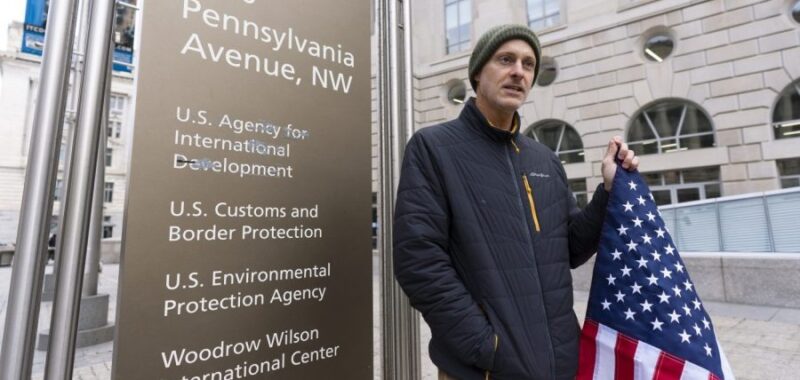
“Whenever the people are well-informed,” Thomas Jefferson opined, “they can be trusted with their own government; that whenever things get so far wrong as to attract their notice, they may be relied on to set them right.” Nations that “expect to be ignorant and free,” Jefferson added, “expect what never was and never will be.”
But as demonstrated by the Trump administration’s takedown of the U.S. Agency for International Development, disinformation, amplified by social media, poses an even greater threat to democracy than ignorance does.
Over the last few weeks, Elon Musk, chair of the so-called Department of Government Efficiency, posted hundreds of denunciations of USAID. The agency, he declared without evidence is a “criminal money laundering organization,” a “viper’s nest of radical Marxists who hate America” and “a ball of worms.”
Because the agency provided grants to Eco Health Alliance to collaborate with the Wuhan Institute of Virology in China, which has been accused of releasing COVID-19 from a lab, Musk claimed that “our tax dollars were used effectively, to, in the end, kill Americans.” Musk also shared a fake video, produced by Russia, showing USAID paying celebrities to visit Ukraine. The time has come, he asserted, for USAID “to die.”
Meanwhile, President Trump asserted that USAID staff “turned out to be radical left lunatics.” A report on the “tremendous fraud” at USAID, he indicated, would soon be released. A few days later, Trump fired the USAID’s inspector general after he issued a report warning that $489 million in food assistance risked being wasted or spoiled because of the administration’s freeze on shipments, delivery and distribution.
The falsehoods were at times surreal. Trump claimed that USAID provided “100 million in condoms to Hamas.” Family planning is indeed an agency priority. USAID has distributed oral contraceptives, IUDs and condoms, about 90 percent of them to help fight AIDS in Africa — but no condoms in Gaza, even though it’s dangerous for women living there to get pregnant.
Moreover, since condoms cost four cents apiece, $100 million would buy 2 billion of them, a large amount for the 2 million Palestinians in Gaza. (USAID funds did go to Gaza to support field hospitals, surgeries, the deliveries of thousands of babies and food for malnourished people.)
“The long list of crap” funded by USAID, according to White House Press Secretary Karoline Leavitt included $2 million for sex changes in Guatemala, $6 million to fund tourism in Egypt, $20 million for a new “Sesame Street” show in Iraq, $4.5 million to counter disinformation in Kazakhstan, $70,000 for a DEI musical in Ireland and $79,000 for transgender operas in Colombia and Peru.
USAID did fund the “Sesame Street” program as part of its campaign to enhance the education of children. And countering disinformation in Kazakhstan seems reasonable. The gender affirming initiatives in Ireland, Colombia and Peru were funded by the State Department, not USAID.
Speaker of the House Mike Johnson (R-La.) — who has expressed no concern about Trump and Musk’s usurpation of the authority of Congress, which funds USAID — alleged that the agency provided $100 million to Nepal to encourage atheism. Fact-checkers report that the grant was part of a State Department initiative to promote religious freedom, including but not limited to “the freedom to dissent from religious belief and to not practice or adhere to a religion.” A spokesman for the department claimed that the grant “saved many, many lives.”
Ian Bremer, head of the well-respected Eurasia Group consulting firm, acknowledged legitimate criticisms of the USAID’s bureaucracy, but stated that “the idea that the organization is somehow criminal or evil or that all the money is wasted is, on its face, ludicrous.”
USAID’s $43 billion budget comprises 0.7 percent of annual federal government expenditures. Most of its money, spread across some 160 countries, is spent on health services, disaster relief, poverty mitigation, economic development, peace and security. Agency goals also include building relationships with current and future leaders, reducing the threat of terrorism and preventing infectious diseases from crossing borders.
Ukraine is by far the biggest recipient of USAID grants, which, for example, help keep the country’s electric grid operating. USAID programs are implemented by non-government organizations, nonprofits and private contractors, bypassing corrupt regimes.
As a senator, Marco Rubio (R-Fla.) in 2012 supported USAID as a “very cost-effective way” to export American values, “advance our security and our economic interests.” It will “not be easy to radicalize people who are alive because the American taxpayer saved their lives and the lives of their children.” Foreign aid “is not charity,” Rubio maintained in 2017. Its funding helps “counter the Communist Party’s expanding global influence in China,” he emphasized.
But Secretary of State Rubio now claims USAID is operating a “global charity.” And he denies that scaling back agency activities would allow China to enhance its standing with developing countries.
This message may well resonate with voters, whose support for an active American role in world affairs and financial and military assistance to other countries has declined since the end of the Cold War. Public disapproval of foreign aid is based in part on ignorance about how much it costs. Almost half of Americans believe that more than 20 percent of the annual federal budget is spent on foreign aid (just 3 percent know the correct amount).
These days, with podcast star Joe Rogan telling millions of listeners, “Can’t just be spending all our f—king money on nonsense,” Americans are getting a green light to applaud the demonization of career public servants, the decimation of foreign aid and a blatant power grab by the executive branch.
Thomas Jefferson likely would be — and we definitely should be — anxious, angry and aroused to action by the possibility that the false narrative about USAID is a canary in American democracy’s coal mine.
Glenn C. Altschuler is the Thomas and Dorothy Litwin Emeritus Professor of American Studies at Cornell University.

